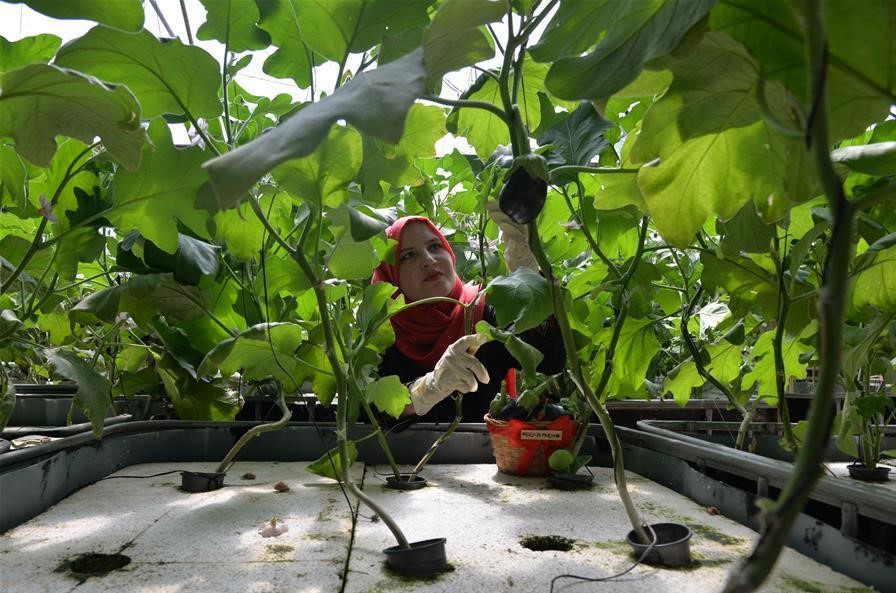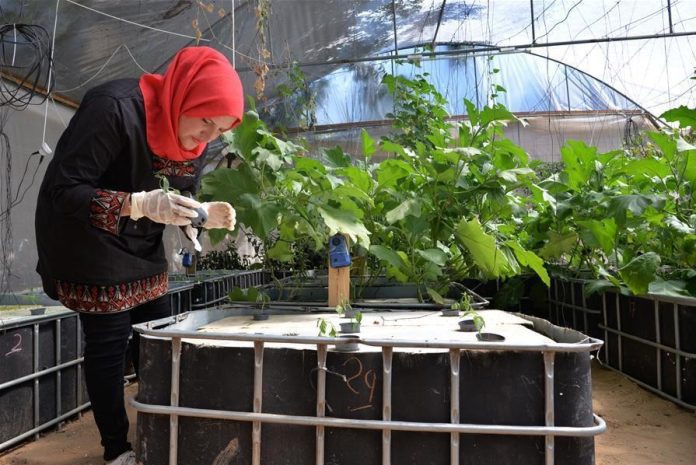To overcome the agricultural problems faced by farmers in the besieged Gaza Strip, newly-graduated Palestinian agricultural engineer Irada Al-Za’anin has established the first-ever “water farm” in her house.
The project aims to reduce the area used in agriculture, saving effort and time as well as maintaining the amount of water used for irrigation.
Al-Za’anin, 24, from the northern Gaza Strip town of Beit Hanoun, implemented her agricultural project, which is the first of its kind in Gaza, on 70 square meters of water basins, planting basic agricultural crops such as tomato, eggplant, chilli, cucumber, lemon and other crops.
“Last month I reaped tomatoes, which were equivalent to a ton of healthy and fresh tomatoes. This is a proof of the success of my project,” al-Za’anin told Chinese news agenxy Xinhua, while picking eggplants.
“The aquaculture project is primarily aimed at increasing the amounts of agricultural crops, which can be up to three times higher than those normally grown in soils,” she said.

Photo Credit: Rizek Abdeljawad/Xinhua
She noted that saving time and efforts also encouraged farmers to adopt this type of agriculture in the near future.
The young woman stressed that hydroponics is not costly and could also contribute to self-sufficiency in agricultural crops, adding that it helps secure all crops throughout the year.
Hydroponics is a method of growing plants using mineral nutrients in water without soil. It typically uses 90 percent less water than the conventional agriculture does.
The Gaza Strip suffers from an acute lack of water for human and agriculture use, in addition to water pollution, which contributes significantly to the spread of some diseases due to human consumption of agricultural crops irrigated with contaminated groundwater.
READ ALSO: Ogoni cleanup: Group frowns at quality of HYPREP’s work
In addition, agricultural lands are declining as a result of the growing population in the Israeli-besieged seaside territory, which leads people to the horizontal and vertical expansion of urbanization, further contributing to the eradication of agricultural areas.
“This agricultural system will provide more safe and healthy food since farmers will not need to use chemical pesticides and industrial hormones,” the engineer said.
In her agricultural project, Al-Za’anin relies on water basins, which are sterilized by moving them through electric pumps that supply oxygen to ensure that water is not contaminated. Over 90% of water in the Gaza Strip is contaminated as spare parts to repair purification plants are not allowed in due to Israeli restrictions on Gaza.

Photo Credit: Rizek Abdeljawad/Xinhua
Meanwhile, the Ministry of Agriculture in Gaza said Al-Za’anin’s project is one of the pioneering projects that ensure sustainable development, in addition to being an essentially environment-friendly project.
“Al-Za’anin has been able to prove that Palestinian youths are able to challenge all the circumstances and create a new environment for them through creative ideas that contribute essentially to overcome all the obstacles of life,” Adham al-Bassiouni, director of agricultural ministry in northern Gaza, told Xinhua.
READ ALSO: The Amazon Rainforest is burning and this is why it concerns you
Al-Bassiouni added that such development projects are usually a key factor for many farmers who always seek to increase their agricultural crops, which saves them time and effort and increases profits.

Photo Credit: Rizek Abdeljawad/Xinhua
He noted that the ministry encouraged al-Za’anin to continue her project and transfer her experience to other farmers.
The official pointed out that the Israeli blockade negatively affects the success of such projects, noting that the problem of electricity is one of the most important obstacles threatening the success of this project since it requires electric pumps to move the stagnant water used in agriculture.
The whole Gaza Strip has been placed under a tight Israeli blockade since the Hamas movement won elections in 2006.
In the past decade, Israel has militarily attacked the Gaza Strip three times three, resulting in the loss of thousands of Palestinian lives.
Israeli warplanes regularly launch airstrikes on agricultural land, claiming that they are used by Palestinian armed factions to fire rockets at Israeli towns.
Israel also imposed a buffer zone along the Gaza-Israel borders that takes up 17 percent of Gaza’s total land, making up to 35 percent of available farmland unsafe, with areas close to the border fence being the most restricted.









